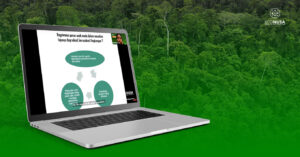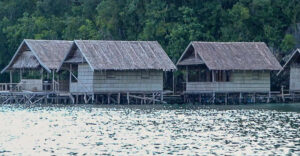
Talking about waste grows to be dismayed issue as the days go by. The pile of waste has been a common sight across not only urban but also many spots far from downtown.
It happens at Mansinam and Musmape Islands in West Papua. The local residents complain about the waste dumped from town which contaminates along the coastal lines at their islands. Similarly happens to the beach of C’Bery Taman Wisata Alam Youtefa Bay, Jayapura, Papua. Responding to the condition, the Natural Resources Conservation Agency jointly with volunteers from various communities and government institutions could collect 748 kilograms of waste in August 2020 sourced from some rivers that flow through Youtefa Bay.
Indonesia as one of the countries with the largest sea territory in the world has been sadly deemed the second largest waste contributor in the world based on Jambeck (2015) study. The International Coastal Cleanup 2019 report conducted by the Ocean Conservancy on May 10, 2019, shows that 97.4 million items of waste were collected around the world. The largest waste was cigarette butts. In Indonesia, the Ministry of Environment and Forestry (MoEF)’s Coastal and Sea Damage and Contamination Control Directorate General recorded plastic waste as the largest waste in Indonesian sea. Bottle cap, plastic bottle and cigarette buts are coming after.
With some policies, the government has made every effort to regulate waste management as stipulated by the Law No. 18/2008 on Waste Management and Environment and Forestry Minister Regulation No. P.71/2019 on Roadmap of Waste Reduction by Producer. Major companies have also taken measures to cope with waste complication through some programs and campaigns in a bid to reduce waste by 30% by 2029.
Read also: Work From Home Cutting Down Waste Reduces?
One of the largest food producers in Indonesia, Indofood, has attempted to cope with waste from product packaging. One of them deals with instant noodle which now uses degradable packaging and do plastic packaging recycling. Indofood has committed to sort out waste and recycle through Green Warmindo program in collaboration with waste bank. Similar measure is also taken by fast food producer, KFC, by educating public not to use single-use straw.
However, waste, particularly of plastic, problem will never find any better solution unless it is done from the upstream or the top producer. This statement was made by Muharram Atha Rasyadi from Greenpeace Indonesia on a virtual discussion entitled “Community and Private Contribution to Solve the Abandoned Waste Problem” as part of the Indonesia Bersih dan Bebas Sampah (Indonesia Clean and Free from Waste) Jamboree 2020 on September 5, 2020. The event is one of the activities of Bergerak Indonesia #BebasSampah initiative as the strategic and participatory movement that facilitates multi-stakeholder roles to find way out of waste puzzles in Indonesia.
“Recycling alone is not enough. It should start from a mindset that plastic production by plastic industry should be limited. It deals with how to promote industry not to use plastic and shift to sustainable packaging. Otherwise, recycling or education programs will be merely a gimmick at the downstream. When plastic production continues and keeps rising every year, plastic waste will be a never-ending predicament,” said Atha.
The CEO of EcoNusa Foundation, Bustar Maitar, who was one of the keynote speakers also addressed similar notion. He asserted that a company as the producer should be completely responsible for plastic production that contaminate land and water.
“If there is no collective change, it will happen that sea will be full of plastic debris more than the fish. Plastic waste will contaminate the sea and affect health and food security with the contaminated fish. Sea debris mostly comes from land. It should be taken into serious account,” said Bustar.
Agustina Iskandar from World CleanUp Day Indonesia called public to undergo waste cleanup collectively and sort out waste as the short-term solution to cope with waste puzzle in Indonesia.
“Despite the short-term solution, cleanup action will at least help the government solve waste problem and be the entry point for public behavioral and awareness shift so as to have more concern with waste,” said Agustina.
Waste predicament should be the collective responsibility after all. The agents of change consisting of civil society, government, private sector, media and public figures should have collective initiative to get the best solution. It is intended that waste would not damage the ecosystem, degrade natural resources potential esthetics and threat environmental health and conservation.
Editor: Leo Wahyudi







